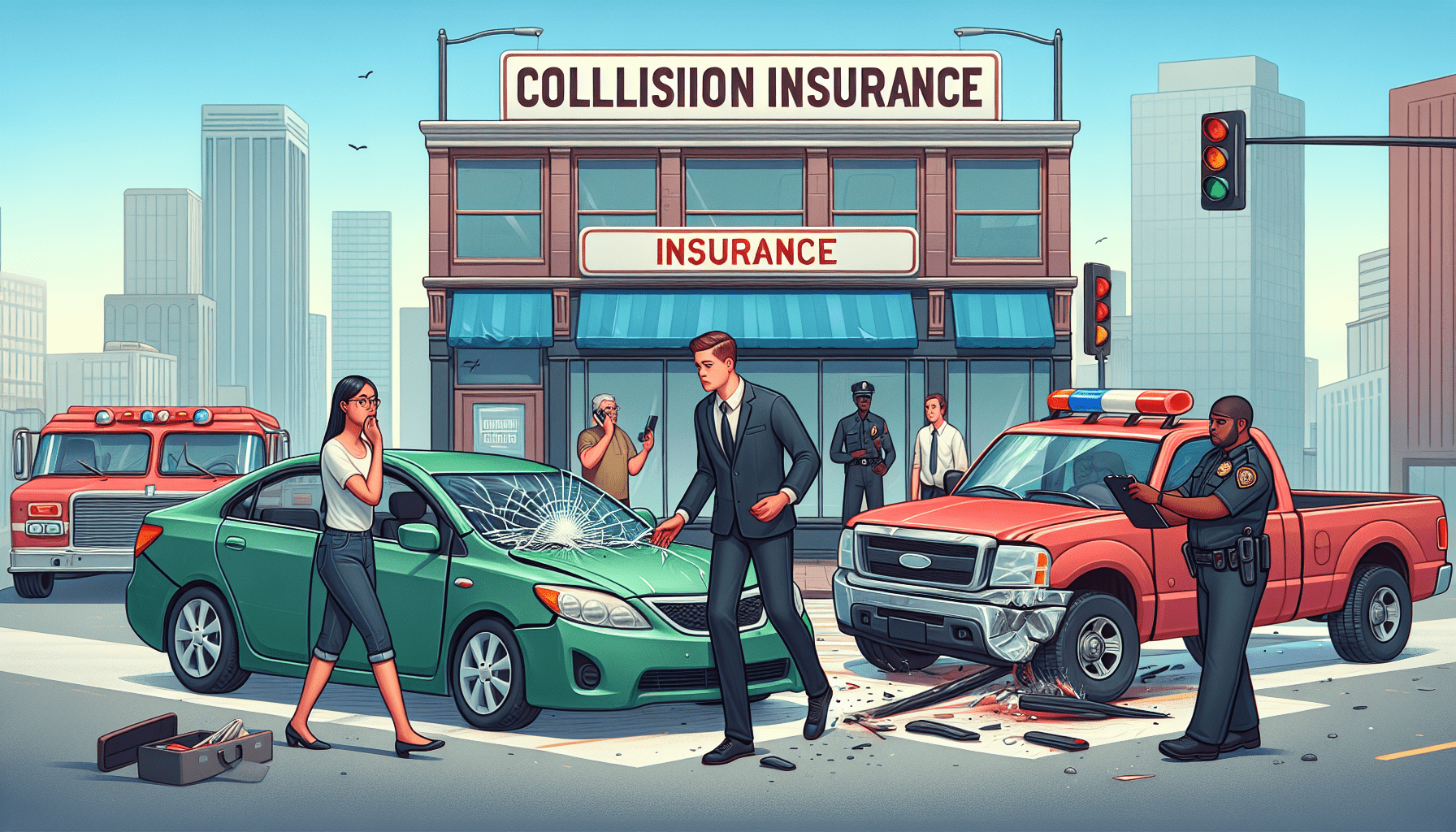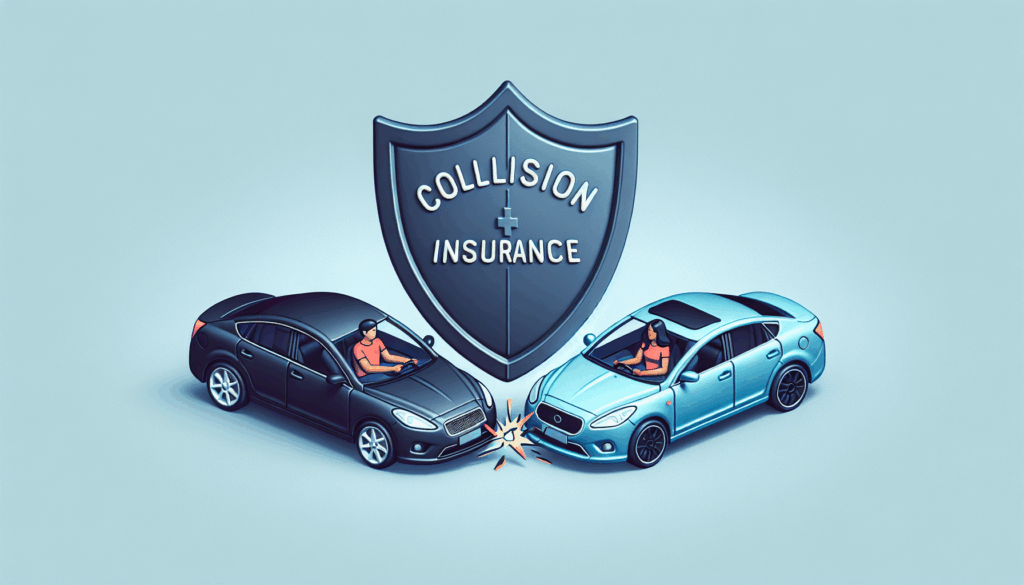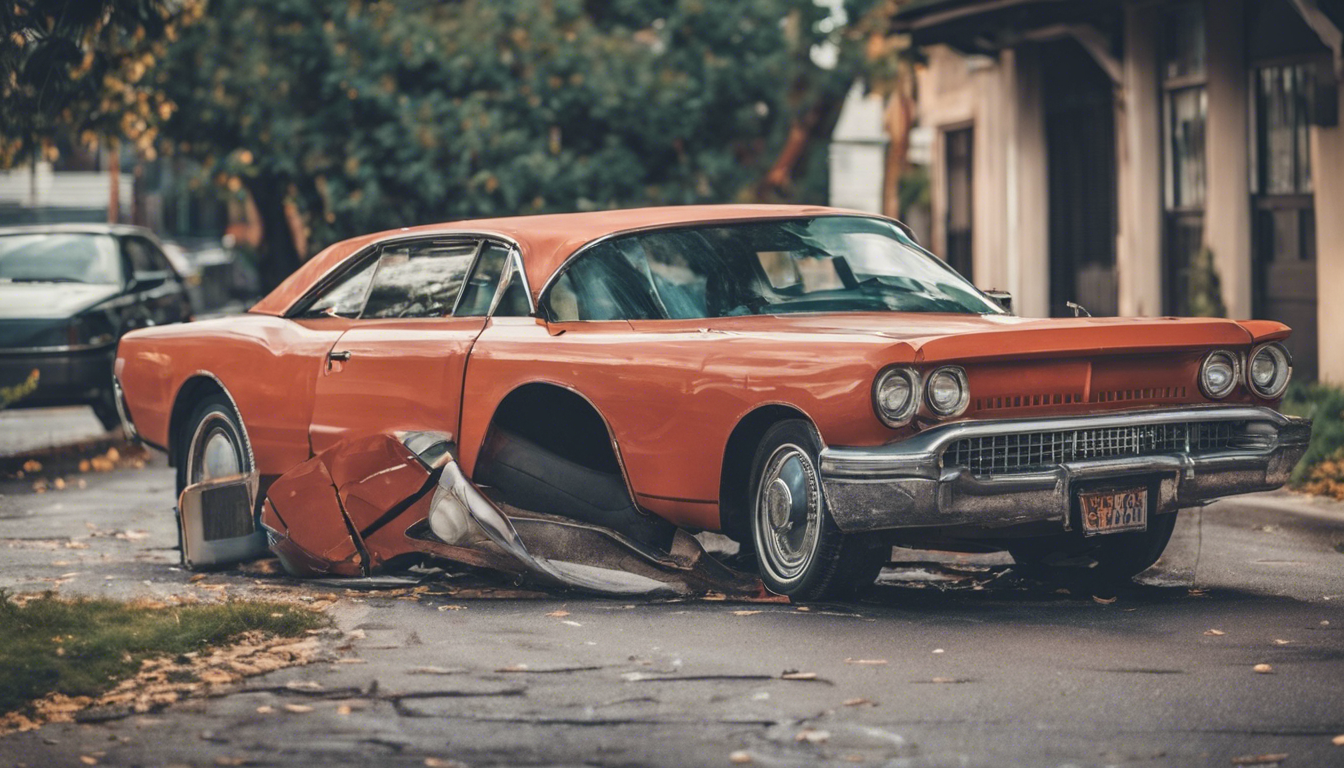Introduction to Collision Insurance
Collision insurance is a type of auto insurance coverage designed to take care of your vehicle repairs or replacement costs if you’re involved in an accident with another vehicle or if you hit an object like a tree or a pole. It’s distinct from liability insurance, which covers damage to other vehicles or property as well as injury to other people in an accident you’re found responsible for.
Opting for collision insurance can offer peace of mind to drivers, ensuring that their own vehicle is protected regardless of who is at fault for the damage incurred. Collision insurance is a critical safeguard for drivers seeking financial protection against vehicle damage from accidents.
This coverage handles repair or replacement costs if your car collides with another vehicle or object, regardless of fault. Particularly vital for owners of newer or high-value cars, it mitigates unexpected expenses from sudden repairs or total loss.
Why Collision Insurance Matters

Collision insurance provides peace of mind in the aftermath of an accident. It ensures that you’re not left stranded with a damaged vehicle and a drained bank account, especially when the collision is with an uninsured motorist or when you’re deemed at fault.
Moreover, this type of insurance is often required by lenders if you’re leasing or financing your car, safeguarding their investment as well as your own financial stability.
Accidents are unpredictable. Without collision coverage, you risk bearing full repair costs. This insurance ensures swift recovery post-accident, complementing liability insurance (which covers others’ damages) by focusing on your own vehicle.
What You’ll Learn
- What collision insurance covers.
- Differences between collision and comprehensive insurance.
- Cost considerations and when to drop coverage.
- FAQs for informed decision-making.
What Is Collision Insurance?
Collision insurance is a type of auto insurance that provides financial protection for drivers in the event of an accident involving their vehicle. It is specifically designed to cover the cost of repairs or replacement of your car if it is damaged or destroyed in a collision, whether it involves another vehicle, a stationary object, or even a rollover.
Unlike liability insurance, which covers damages to other people’s property and injuries, collision insurance is about safeguarding your own investment in your vehicle, offering peace of mind regardless of who is at fault in the accident.
Collision insurance covers repair/replacement costs for your vehicle after accidents involving other cars or stationary objects (e.g., trees, guardrails). Unlike liability insurance, it applies regardless of fault, making it indispensable for financed/leased vehicles or those reliant on daily transportation.
Key Features:
- Covers damage from collisions, rollovers, or hit-and-runs.
- Excludes medical bills, others’ property damage, and non-collision incidents (theft, weather).
- Optional but highly recommended for newer or expensive vehicles.
Collision vs. Comprehensive Insurance
| Feature | Collision Insurance | Comprehensive Insurance |
|---|---|---|
| Covers crash damage | Yes | No |
| Covers theft, vandalism | No | Yes |
| Covers hitting an animal | No | Yes |
| Legally required | No | No |
Synergy: Synergy between collision and comprehensive insurance is key for drivers seeking full protection for their vehicles. While neither is legally mandated, together they form a robust shield against a wide array of mishaps that can occur both on and off the road.
Opting for both types of coverage ensures that whether you’re dealing with the aftermath of a fender bender or the unfortunate event of a stolen car, you’re financially safeguarded against the unexpected. Combining both policies offers full protection against collisions and non-collision events (e.g., natural disasters, theft).
Should You Keep Collision Insurance on an Older Car?
Consider these factors:
1: Car Value: If your car’s value is significantly diminished due to age or mileage, the cost of maintaining collision insurance may outweigh the potential benefit. It’s essential to assess the current market value of your vehicle and compare it to the collision coverage deductible and the annual insurance premium.
If your car’s worth is close to or less than the sum of your deductible and yearly payments, it might be more economical to save that money for a replacement vehicle instead of paying for collision coverage. If repairs exceed the car’s value or your deductible, consider dropping coverage.
2: Premium Costs: Assessing Risk Factors: When deciding whether to keep or drop collision coverage, it’s important to evaluate your individual risk factors. Consider the likelihood of an accident based on your driving history, the amount of time you spend on the road, and the traffic conditions in your area.
If you have a track record of safe driving and you navigate less congested routes, you might be more inclined to forgo collision coverage, especially if your vehicle is older and less valuable.
However, if you’re frequently driving in high-traffic areas with a higher risk of incidents, maintaining your coverage could provide valuable peace of mind. Compare annual premiums to potential payouts. High premiums on low-value cars may not justify coverage.
3: Financial Stability: Customization of Coverage: Assessing your personal needs is crucial when considering insurance options. Tailor your policy to fit your lifestyle by opting for add-ons that are relevant to your driving habits and risk exposure.
For instance, if you live in an area prone to natural disasters, comprehensive coverage with protection against environmental damage might be a wise choice.
On the other hand, if you’re an urban dweller with access to public transportation and drive infrequently, you might opt for a policy that focuses on the essentials with a lower premium.
Balancing the cost against the benefits ensures that your insurance is both cost-effective and adequately protective. Can you afford repairs/replacement out-of-pocket? If yes, dropping coverage may be viable.
What Does Collision Insurance Cover?
- Accidents with other vehicles or objects.
- At-fault collisions, hit-and-runs, or uninsured drivers.
- Vehicle rollovers.
Exclusions:
- Medical expenses (covered by health/PIP insurance).
- Others’ property damage (covered by liability insurance).
- Non-collision incidents (e.g., theft, hail—requires comprehensive insurance).
Cost of Collision Insurance
Premiums vary based on:
1: Vehicle value (newer/luxury cars cost more to insure).
2: Driving history (clean records lower premiums).
3: Location (urban areas often have higher rates).
4: Deductible (higher deductibles reduce premiums).
Average cost: 25–25–50/month.
Risks of Not Having Collision Insurance
If at fault without coverage:
1: You would be responsible for all repair costs to your own vehicle, which can be financially overwhelming, especially with luxury vehicles where parts and labor are costly.
You may also face legal action if you’re unable to pay for damages to another party’s property, leading to further financial and legal complications.
Additionally, without collision coverage, you could be left without a vehicle if it’s deemed a total loss, disrupting your daily life and potentially impacting your ability to work or manage personal responsibilities. Full responsibility for repairs.
2: Given the potential risks, it’s crucial to weigh the benefits of collision coverage against its costs. While it may seem like an additional expense on top of your regular insurance premiums, the investment can safeguard you from the hefty out-of-pocket costs associated with vehicle repairs or replacement.
Ultimately, the decision should be informed by your specific circumstances, including the age and value of your vehicle, your driving habits, and your financial ability to absorb unexpected expenses. Financial strain from out-of-pocket costs.

3: When considering AI personalization, it’s essential to understand how it can transform the user experience. By leveraging machine learning algorithms, AI can analyze vast amounts of data to tailor services and products to individual preferences.
This not only enhances customer satisfaction but also boosts the efficiency of the service provided, ensuring that recommendations and solutions are aligned with the user’s unique needs and habits.
In the context of vehicle maintenance, AI personalization could predict potential issues and suggest preventative measures, thereby reducing the likelihood of costly repairs down the line. Reliance on others’ insurance if they’re at fault (risky if underinsured).
When to Drop Collision Insurance
1: Low Vehicle Value: If the market value of your vehicle has depreciated significantly, maintaining collision insurance may not be financially prudent. The cost of the premium could outweigh the benefits, especially if the potential payout in the event of an accident is minimal compared to the deductible you’re required to pay.
In such cases, it might be more sensible to save the money you would spend on collision coverage and put it toward a future vehicle purchase or an emergency fund for repairs. Repairs exceed the car’s worth.
2: High Premiums: However, it’s crucial to weigh the potential risks against the savings. If you’re driving an older car that’s not worth much in the eyes of the insurance company, the premiums for collision coverage might indeed be disproportionately high. In this scenario, you could consider dropping the collision coverage, but it’s important to have a solid backup plan.
Without this coverage, you’ll be fully responsible for any repair costs in the event of an at-fault accident, which could put a significant strain on your finances if you’re not prepared. Costs outweigh potential benefits.
3: Financial Readiness: To ensure financial readiness, it’s essential to assess your current financial situation and consider the potential costs associated with vehicle repairs or replacements. Creating an emergency fund specifically for automotive contingencies can provide a buffer against unexpected expenses, safeguarding your budget from the impact of unforeseen events.
Additionally, regularly reviewing and adjusting your insurance coverage can help you stay protected as your circumstances and the value of your vehicle change over time. Savings can cover unexpected repairs.
Quiz Yourself:
- Is your car’s value below $3,000?
- Are premiums over 10% of the car’s value?
- Can you afford a $2,000 repair?
Case Study: John’s Lifesaver
If you answered ‘yes’ to any of the questions above, it might be time to reconsider your current insurance coverage. John, for instance, found himself in a predicament when his transmission failed unexpectedly.
After a quick review, he realized his premiums were disproportionately high compared to his car’s current value, and the coverage no longer matched his needs.
By opting for a personalized insurance plan tailored to his situation, John was able to save money on premiums and set aside funds for future repairs, effectively turning a potential crisis into a manageable situation.
John avoided a deer but hit a tree, causing 8,000indamage.Witha8,000indamage.Witha500 deductible, his collision insurance covered $7,500. Without it, he’d face the full cost.
FAQs
1: Is collision insurance legally required?
While collision insurance isn’t legally mandated, it’s often required by lenders if you’re financing or leasing your vehicle. This is because it protects their financial interest in the car until they’ve paid off your loan or lease.
Even if you own your vehicle outright, opting for collision coverage can be a wise financial decision, as it helps safeguard against the potentially high costs of repairs after an accident. No, but lenders/lessors often mandate it.
2: Does it cover weather damage?
Collision coverage typically does not protect against damage from weather-related incidents; that falls under the purview of comprehensive insurance. Comprehensive coverage is designed to help with the cost of repairs for things like hail damage, flooding, or fallen tree limbs.
To ensure you’re fully protected against Mother Nature’s unpredictability, it’s advisable to consider adding comprehensive insurance to your auto policy alongside collision coverage. No—comprehensive insurance does.
3: Can I get collision without comprehensive?
Certainly, you can opt for collision coverage without adding comprehensive insurance to your auto policy. Collision coverage specifically addresses damages to your vehicle resulting from an accident involving another vehicle or an object, like a guardrail or a pole.
However, by forgoing comprehensive insurance, you leave your vehicle unprotected against a variety of other incidents that could occur without a collision, such as theft, vandalism, or environmental damage.
It’s essential to weigh the risks and consider the value of your vehicle when deciding whether comprehensive coverage is a prudent addition to your auto insurance portfolio. Yes, but combining both is advisable for full coverage.

Conclusion
In the realm of auto insurance, AI personalization is revolutionizing the way policies are tailored to individual needs. By analyzing vast amounts of data, AI algorithms can predict risk with greater accuracy, allowing insurers to offer personalized rates and coverage options.
This not only benefits consumers by potentially lowering premiums for safe drivers but also streamlines the claims process, making it faster and more efficient when accidents do occur.
As technology continues to advance, we can expect AI personalization to become an increasingly integral part of the auto insurance landscape, offering a more customized and user-friendly experience.
Collision insurance is a strategic investment to avoid hefty repair bills. Regularly assess your car’s value, financial capacity, and premiums to decide if coverage remains cost-effective.
Call to Action
To ensure you’re making the most informed decision, consider leveraging AI-driven tools that many insurers now offer. These sophisticated systems can analyze your driving habits, vehicle information, and claims history to tailor your collision insurance policy to your specific needs.
By embracing this personalized approach, you not only optimize your coverage but potentially unlock savings and enhance your peace of mind as a motorist. Explore tailored insurance options! Share this guide with fellow drivers or comment below with your collision insurance experiences.
Engage & Share!
Found this helpful? Navigating the world of auto insurance can be a complex journey, but with AI personalization, it becomes a streamlined, user-friendly experience. By harnessing the power of artificial intelligence, insurers can analyze vast amounts of data to offer you policies that align perfectly with your driving habits and risk profile.
This not only simplifies the decision-making process but also ensures that you’re not overpaying for coverage that doesn’t match your needs. Embrace the future of insurance with AI-driven personalization and drive with confidence, knowing you’re fully protected. Spread the knowledge on social media and join the conversation below!

